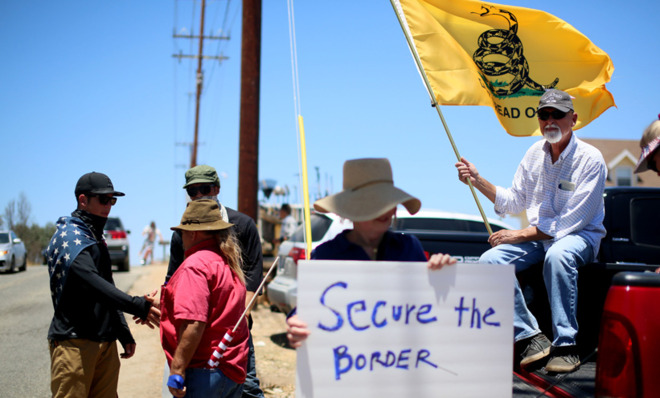The Tea Party might be fundamentalist. But it isn't Christian.
Behold the power of empty symbols

A free daily email with the biggest news stories of the day – and the best features from TheWeek.com
You are now subscribed
Your newsletter sign-up was successful
At The Daily Beast, Jack Schwartz has a sharp analysis of the Tea Party movement. With a keen observation of Tea Party symbols, rhetoric, and fall-back texts, Schwartz concludes that the movement has the shape of a faith, with all relevant signals, rituals, and shibboleths:
Given the confusions of a secular world being rapidly transformed by technology, demography, and globalization, this movement has assumed a spiritual aspect whose adepts have undergone a religious experience that, if not in name, then in virtually every other aspect, can be considered a faith. [The Daily Beast]
Schwartz's analysis seems strong and straightforward. And yet the Tea Party doesn't consider itself a faith movement born ex nihilo of a collective right-wing id; it considers itself Christian. The fact that the Christian contours of the Tea Party movement are no longer really recognizable aside from their spiritual dimensions (which, as Schwartz aptly demonstrates, can be identified with any faith movement) underscores the degree to which the Tea Party movement has mutilated its Christian principles.
According to TeaParty.org, the party's platform centers around "those who possess a strong belief in the foundational Judeo-Christian values embedded in our great founding documents," though the specific values are never clearly delineated. Instead, the Constitution is the holy scripture of choice; it's merely taken for granted that there's Christianity wrapped up inside it somewhere.
The Week
Escape your echo chamber. Get the facts behind the news, plus analysis from multiple perspectives.

Sign up for The Week's Free Newsletters
From our morning news briefing to a weekly Good News Newsletter, get the best of The Week delivered directly to your inbox.
From our morning news briefing to a weekly Good News Newsletter, get the best of The Week delivered directly to your inbox.
The same can be said of the Tea Party's governing tenets, which TeaParty.org defines as "Commonsense, Conservative, Constitutional Self-Governance Is Our Mode Of Operation," then immediately noting, "Yes, we are a Christian nation. However, you do not have to be a Christian to enjoy freedom." The Christianity is simply tacked on: the principles relating to small government and particular economic outcomes are listed first, and then there is a reassurance that there's Christianity tangentially linked in somehow. But the work to demonstrate that linkage is never done.
And this isn't just a rhetorical style, but a long-standing, frequently repeated habit of forming and articulating political ideas among the Tea Party set. Consider Sen. Rand Paul, a Tea Party darling now lining up to jockey for the Republican presidential bid. In discussing faith and politics with a group of medical students, Paul had this to say:
I think we as physicians have an obligation. As Christians, we have an obligation... I really believe that, and it's a deep-held belief… As humans, yeah, we do have an obligation to give people water, to give people food, to give people health care.
But it's not a right because once you conscript people and say, "Oh, it's a right," then really you're in charge, it's servitude, you're in charge of me and I'm supposed to do whatever you tell me to do. [Paul via National Review]
What is the difference between having an "obligation" to do something for someone and that person having some claim over your actions? If there is a delicate philosophical distinction to be made, Paul isn't up to the task. The idea that a right to health care results in the conscription of physicians is on its face absurd, but the point remains that locating Paul's professed Christian reasoning within his opposition to universal health care is challenging. The two realities — that he opposes universal health care and that he is reasoning as a Christian — are posed together, but the conjunction between them is left unclear.
When it comes to the refugee crisis at the U.S. border, Tea Party types, galvanized by opportunistic media figures like Sean Hannity, are having a field day. And while a multitude of Christian groups have spoken out for the protection of refugee children (noting that Christ himself was a child refugee), Tea Partiers congregating at the border seem only interested in clamoring for armed expulsion of these children. Classifying the refugee crisis as an "invasion," the Tea Party's website refers to the likeness between children set adrift by violent circumstances and Jesus only derisively. Again, if there is a connection between the professed Christian principles of the party and its policies, it exists in the murky realm of imagination, where ambient relationships between ethics and policy suffice.
A free daily email with the biggest news stories of the day – and the best features from TheWeek.com
It's telling that the Christian foundations of the Tea Party movement have been stretched so thin by its genuine ideology that it can no longer really be identified with Christian politics. And yet the attempt to forge a connection in the minds of voters remains. It seems finally possible then that Schwartz's point might prevail, with one minor addition: The Christianity of the Tea Party is merely a set of empty signals meant to entice but not fulfill.
-
 Health insurance: Premiums soar as ACA subsidies end
Health insurance: Premiums soar as ACA subsidies endFeature 1.4 million people have dropped coverage
-
 Anthropic: AI triggers the ‘SaaSpocalypse’
Anthropic: AI triggers the ‘SaaSpocalypse’Feature A grim reaper for software services?
-
 NIH director Bhattacharya tapped as acting CDC head
NIH director Bhattacharya tapped as acting CDC headSpeed Read Jay Bhattacharya, a critic of the CDC’s Covid-19 response, will now lead the Centers for Disease Control and Prevention